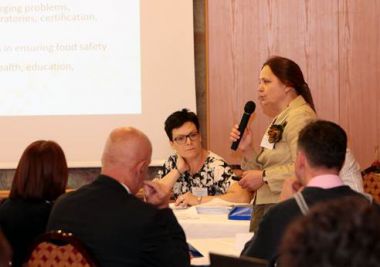Countries improve their early warning capabilities for food safety

1 June 2015, Budapest, Hungary – Consumption of unsafe food is an important cause of morbidity and mortality worldwide. The potential for food safety hazards to cross borders and continents has increased with globalization, and with the growth of international trade in food and feed commodities.
To address this growing issue, a four-day regional workshop for people working in various sectors concerned with food safety gets under way here today.
Organized by the Food and Agriculture Organization of the United Nations (FAO), the workshop aims to raise awareness of the approaches currently available for preventing food safety incidents, prepare the region to respond effectively to food safety emergencies, and support risk management decision making.
Food safety professionals from Albania, Bosnia and Herzegovina, Croatia, Georgia, Hungary, Macedonia, Moldova, Montenegro, Romania, Russian Federation, Serbia, Turkey, and Ukraine will be in attendance. Along with FAO professionals and consultants the training is technically supported by representatives of three European Union institutions – the European Food Safety Authority, the Rapid Alert System for Food and Feed, and the European Center for Disease Prevention and Control.
As part of the training, participants will be using, testing and providing feedback on a new handbook developed by FAO’s Emergency Prevention System for Food Safety. Entitled Enhancing early warning capabilities and capacities for food safety, the handbook is designed to help countries develop strategies for improving their national early warning systems, for better connecting early warning signals to effective actions, including better links to regional and global rapid alert communication networks.
Both the workshop and the handbook are part of a larger effort by FAO to establish national early warning systems for food safety. The goal of a national early warning system is to detect signals of food safety hazards early, and stop incidents before they get out of control.
“The handbook and training will introduce and explain key concepts of early detection of signals through surveillance and intelligence in the food chain,” said FAO food safety and consumer protection officer Eleonora Dupouy who is co-chairing the event together with food safety officer Andrijana Rajic. “The workshop itself is a unique opportunity to stimulate discussion on developing and strengthening early warning systems at the national level.”
“Food safety early warning stands at the intersection of the agri-food and public health sectors,” said Dupouy. “Improving the system requires well-coordinated efforts from all concerned parties – from national agri-food and public health authorities to the private sector to consumers.”
 KOHA JONË SONDAZH
KOHA JONË SONDAZH




















